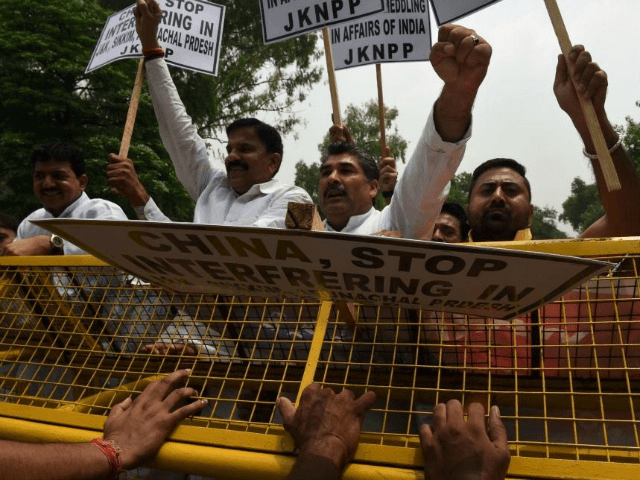China’s state-run media is accusing Indian Prime Minister Narendra Modi of stoking “intense nationalism” in the country and taking advantage of anti-Chinese sentiment to amass power in columns published this week. The articles follow a month-long dispute along the mutual border near Bhutan, exacerbated by China’s recent haul of major military hardware towards India.
“The election of Indian Prime Minister Narendra Modi has fueled the country’s nationalist sentiments. Modi took advantage of rising Hindu nationalism to come to power,” a column in China’s Global Times claimed Wednesday. The article adds a warning that the forces that brought Modi to power demand he “act tougher in foreign relations, especially toward countries like Pakistan and China,” and that one day Modi may no longer be able to control them, saying, “The Modi government can do nothing if religious nationalism becomes extreme.”
The People’s Daily, another government newspaper, published a similar article last week titled “Turning a deaf ear to China will not help India on Doklam” (Doklam is the disputed territory in which India has placed troops, infuriating Beijing). The article warns that India faces international “embarrassment” and raises the same specter of “intense nationalism” as a threat to the bilateral relationship.
“In recent years, some Indian civil groups, tinted with intense nationalism, have been constantly stirring up anti-China sentiments,” the article claims, blaming “senior officials” who have “made irrational remarks, which further fueled the unnecessary tension.”
The tensions between China and India revolve around the Sikkim territory between the two countries, also claimed by the small nation of Bhutan. India objected in June to China’s attempts to construct a road through territory that neither nation considered Chinese, and deployed troops into Chinese-claimed territory. That month, the Global Times accused the Indian government of “bringing disgrace to themselves” by deploying troops past the Chinese-designated border.
This month, China moved “tens of thousands of tons of military vehicles and hardware” into the area, according to Indian media reports and Chinese state news outlets. The Hindu notes that much of this hardware is being stationed in Tibet, and cites China’s People’s Liberation Army Daily as only announcing the move on Wednesday but that it had occurred a month ago, and that troops were staging military exercises in the region this week.
Lest the relationship between the move and the Sikkim issue remain unclear, the People’s Daily published a story stating that the deployment of such military assets has “sent a strong message to India amid the two nations’ standoff in the border area,” according to “experts.” The People’s Daily goes on to note that the military exercises in question “used high-tech weaponry and multi-force attacks on the 5,000-meter-high plateau.”
Two weeks ago, India began a joint exercise with the United States called Malabar 2017, which continued throughout the month and was scheduled to end Monday. Many suggested these exercises were meant to discourage further Chinese military action in the region. Asked about tensions between the two countries on July 11, Chinese Foreign Ministry spokesman Geng Shuang delivered an incendiary condemnation of India, calling the military deployment in Sikkim an “illegal trespass.”
“The Sikkim section of the China-India boundary has come to existence against special historical background, and it is the only delimited section of the China-India boundary, which is totally different from the undefined eastern, central and western sections,” Geng noted. “The Chinese side demands that the Indian side immediately pull the Indian border troops back to the Indian side of the boundary and properly settle this incident.”
This week, the Chinese government reiterated its stance. “We have repeated our position on this trespassing incident so many times that you must be very clear about that,” spokesman Lu Kang told reporters. “We keep stressing that India should get a clear understanding of the current situation, take prompt measures to withdraw its personnel who have illegally crossed the boundary back to India’s side, so as to avoid further escalation of the situation.”

COMMENTS
Please let us know if you're having issues with commenting.